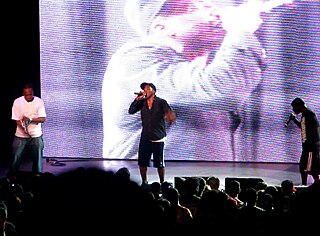Related Research Articles

A nursery rhyme is a traditional poem or song for children in Britain and many other countries, but usage of the term dates only from the late 18th/early 19th century. The term Mother Goose rhymes is interchangeable with nursery rhymes.
A rhyme is a repetition of similar sounds in the final stressed syllables and any following syllables of two or more words. Most often, this kind of perfect rhyming is consciously used for a musical or aesthetic effect in the final position of lines within poems or songs. More broadly, a rhyme may also variously refer to other types of similar sounds near the ends of two or more words. Furthermore, the word rhyme has come to be sometimes used as a shorthand term for any brief poem, such as a nursery rhyme or Balliol rhyme.

Humpty Dumpty is a character in an English nursery rhyme, probably originally a riddle and one of the best known in the English-speaking world. He is typically portrayed as an anthropomorphic egg, though he is not explicitly described as such. The first recorded versions of the rhyme date from late eighteenth-century England and the tune from 1870 in James William Elliott's National Nursery Rhymes and Nursery Songs. Its origins are obscure, and several theories have been advanced to suggest original meanings.

A Tribe Called Quest was an American hip hop group formed in Queens, New York City, in 1985, originally composed of rapper and main producer Q-Tip, rapper Phife Dawg, DJ and co-producer Ali Shaheed Muhammad, and rapper Jarobi White. The group is regarded as a pioneer of alternative hip hop and merging jazz with hip hop, influencing numerous hip hop and R&B musicians.

Trevor George Smith Jr., known professionally as Busta Rhymes, is an American rapper, record producer, and actor. Chuck D of Public Enemy gave him the moniker Busta Rhymes, after NFL and CFL wide receiver George "Buster" Rhymes. He has received 12 Grammy Award nominations for his work, making him one of the most-nominated artists without winning.

Eric B. & Rakim are an American hip hop duo formed on Long Island, New York, in 1986, composed of DJ Eric B. and rapper Rakim. They first received acclaim for their 1987 debut album Paid in Full, which featured versions of the popular singles "Eric B. Is President" and the title track. They followed with three successful albums: Follow the Leader (1988), Let the Rhythm Hit 'Em (1990), and Don't Sweat the Technique (1992).

William Michael Griffin Jr., better known by his stage name Rakim, is an American rapper. He is one half of golden age hip hop duo Eric B. & Rakim, with whom he released four albums: Paid in Full (1987), Follow the Leader (1988), Let the Rhythm Hit 'Em (1990), and Don't Sweat the Technique (1992). He also released three solo albums: The 18th Letter (1997), The Master (1999), and The Seventh Seal (2009).

Kamaal Ibn John Fareed, better known by his stage name Q-Tip, is an American rapper, record producer, singer, and DJ. Nicknamed the Abstract, he is noted for his innovative jazz-influenced style of hip hop production and his philosophical, esoteric and introspective lyrical themes. He embarked on his music career in the late 1980s, as an MC and main producer of the influential alternative hip hop group A Tribe Called Quest. In the mid-1990s, he co-founded the production team The Ummah, followed by the release of his gold-certified solo debut Amplified in 1999. In the following decade, he released the Grammy Award-nominated album The Renaissance (2008) and the experimental album Kamaal the Abstract (2009).

Beats, Rhymes and Life is the fourth studio album by American hip hop group A Tribe Called Quest. Released on July 30, 1996, by Jive Records, it followed three years after the highly regarded and successful Midnight Marauders. Produced by The Ummah, the album is a departure from the joyful, positive vibe of the group's earlier albums and is regarded as their darkest album in content. It debuted at number one on the Billboard 200 and was certified platinum by the Recording Industry Association of America (RIAA) on October 27, 1998.

The Rhymers' Club was a group of London-based male poets, founded in 1890 by W. B. Yeats and Ernest Rhys. Originally not much more than a dining club, it produced anthologies of poetry in 1892 and 1894. They met at the London pub ‘Ye Olde Cheshire Cheese’ in Fleet Street and in the 'Domino Room' of the Café Royal.
"Miss Susie", also known as "Hello Operator", "Miss Suzy", "Miss Lucy", and many other names, is the name of an American schoolyard rhyme in which each verse leads up to a rude word or profanity which is revealed in the next verse as part of an innocuous word or phrase. Originally used as a jump-rope rhyme, it is now more often sung alone or as part of a clapping game. Hand signs sometimes accompany the song, such as pulling on the bell in the first verse or making a phone gesture in the second.
"I Know What You Want" is a song by American rapper Busta Rhymes and singer Mariah Carey, featuring verses from Rhymes' group Flipmode Squad: Spliff Star, Baby Sham, Rah Digga, and Rampage. Produced by Rick Rock, it was released on February 24, 2003 as the second single from Rhymes' sixth album It Ain't Safe No More..., released on November 26, 2002.
The Petrarchan sonnet, also known as the Italian sonnet, is a sonnet named after the Italian poet Francesco Petrarca, although it was not developed by Petrarch himself, but rather by a string of Renaissance poets. Because of the structure of Italian, the rhyme scheme of the Petrarchan sonnet is more easily fulfilled in that language than in English. The original Italian sonnet form consists of a total of fourteen hendecasyllabic lines in two parts, the first part being an octave and the second being a sestet.

Paid in Full is the debut studio album by American hip hop duo Eric B. & Rakim, released on July 7, 1987, by Island-subsidiary label 4th & B'way Records. The duo recorded the album at hip hop producer Marley Marl's home studio and Power Play Studios in New York City, following Rakim's response to Eric B.'s search for a rapper to complement his disc jockey work in 1985. The album peaked at number fifty-eight on the Billboard 200 chart, number eight on the R&B/Hip-Hop Albums chart, and produced five singles: "Eric B. Is President", "I Ain't No Joke", "I Know You Got Soul", "Move the Crowd", and "Paid in Full".
A skipping rhyme, is a rhyme chanted by children while skipping. Such rhymes have been recorded in all cultures where skipping is played. Examples of English-language rhymes have been found going back to at least the 17th century. Like most folklore, skipping rhymes tend to be found in many different variations. The article includes those chants used by English-speaking children.
The formes fixes are the three 14th- and 15th-century French poetic forms: the ballade, rondeau, and virelai. Each was also a musical form, generally a chanson, and all consisted of a complex pattern of repetition of verses and a refrain with musical content in two main sections.

Back on My B.S. is the eighth studio album by American rapper Busta Rhymes. It was released on May 19, 2009, through Flipmode and Universal Motown.

A verse is formally a single metrical line in a poetic composition. However, verse has come to represent any grouping of lines in a poetic composition, with groupings traditionally having been referred to as stanzas.
"Respect My Conglomerate" is a song by American hip hop recording artist Busta Rhymes, released on April 4, 2009, as the third single from Back on My B.S. (2009). It is also featured as a bonus track from Jadakiss's third album The Last Kiss (2009). The track features verses from fellow American rappers Jadakiss and Lil Wayne, and features backing vocals by guest vocalist Debby Coda. The song was released digitally on April 4, 2009.

Luigi "Gino" Bramieri was an Italian comedian and actor. He was especially known as a television comedian, but also performed in theatres, on radio, and in about thirty movies. He was nicknamed "Il Re della barzelletta" for his burlesque comic style, which was largely based on his skill at telling funny stories. His jokes were sometimes as quick as a cut and thrust, and bordering on surrealism. They have been collected in a series of books, such as 50 chili fa.
References
- ↑ Don Harrán. "Barzelletta", Grove Music Online , ed. L. Macy (accessed September 15, 2006), grovemusic.com Archived 2008-05-16 at the Wayback Machine (subscription access).